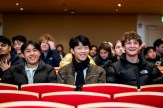A ‘rare and precious moment’
The Northeastern University community celebrated the historic launch of the D’Amore-McKim School of Business on Friday afternoon in Blackman Auditorium.
The naming ceremony honored Richard D’Amore, BA’76, and Alan McKim, MBA’88, two proud Northeastern alumni who have joined forces to make the largest philanthropic investment in the university’s history. As a result of their combined $60 million gift, Northeastern’s College of Business Administration was officially renamed the D’Amore-McKim School of Business.
Some 1,000 people from all over the world who were unable to attend the celebration watched a live video of the festivities on the university's website.
Over the course of the hour-long event, Northeastern leaders reinforced the impact of the gift, which was hailed as a defining investment in the university’s history.
“There are rare and precious moments when something monumental occurs and afterward we are changed forever,” Northeastern University President Joseph E. Aoun told students, faculty, staff, alumni and friends. “Today we are celebrating a moment that will change our institution forever.”
Aoun referred to D’Amore and McKim as the campus’ “new rock stars.” Their profound and visionary gesture, he explained, will shape Northeastern’s academic destiny and “inspire us to take the university to a level of excellence that we could never have imagined.”
[nggallery template=rslides id=15]
D’Amore and McKim expressed their appreciation for the role Northeastern has played in their success. D’Amore is a co-founder and general partner at North Bridge Venture Partners, a venture capital firm based in Waltham, Mass. McKim is the founder and CEO of Clean Harbors, the nation’s leading provider of environmental, energy and industrial services.
D’Amore characterized his investment as a vote of confidence in Northeastern’s students, faculty and senior leaders, all of whom, he said, have remained true to the university’s longstanding “practical, pragmatic and real-world orientation.”
“This is a big day for me,” D’Amore said. “I truly believe in Northeastern’s mission, and I am inspired to know that the university has moved forward yet remained true to its character.”
He acknowledged Northeastern’s “world-class excellence” in experiential learning and entrepreneurship, and praised the university’s students, calling them “more exceptional and more global” than ever before. The numbers back up his words: Northeastern’s unique model of experiential education currently includes co-op, study-abroad and Dialogue of Civilizations programs in 92 countries around the world.
McKim called the celebration a pivotal point in his life. Studying at Northeastern, he added, has “helped shaped who I am as a professional but more importantly as an individual.”
McKim also singled out students in the audience, challenging the young researchers and entrepreneurs to make a difference all over the world through class, co-op and extra-curricular opportunities. “I know this gift will shape tomorrow’s business leaders and entrepreneurs who will create innovations that will improve our lives,” he said. “I hope students will take advantage of what this unique culture has to offer.”
He thanked Daniel J. McCarthy, the Alan S. McKim and Richard D’Amore Distinguished Professor of Global Management and Innovation, for his long-lasting friendship and mentorship. As McKim put it, “We certainly wouldn’t be standing here without him.”
Hugh Courtney, the inaugural dean of the D’Amore-McKim School of Business, bestowed a symbolic gift upon the two heroes of the day: a pair of oversized silver keys to the D’Amore-McKim School of Business. They also received medals honoring their steadfast commitment to the university and a citation in recognition of their gift’s “profound impact on every dimension of experiential education and research.”
“Never before have alumni so clearly earned the respect and honor of our community,” Courtney said.
The keys, he added, symbolized an “open invitation to visit our classes and meet with our students, our faculty and our staff.”
The auditorium was festooned with black and red balloons and half a dozen flat-screen TVs featuring slideshows and videos highlighting the success of the D’Amore-McKim School of Business, which was established in 1922. The school currently comprises 136 world-class faculty members, 3,347 undergraduate students and a network of more than 45,000 alumni.
The university’s pep band belted out songs from the balcony of the auditorium, including the crowd favorite “Takin’ Care of Business,” and a pair of acrobats shimmied up and down red ribbons with great dexterity in a mesmerizing routine set to tribal music. After the unveiling of the D’Amore-McKim School of Business’ new brown and yellow flag, cannons blasted confetti high into the air.
Following the naming ceremony, several hundred members of the Northeastern community attended a reception and student showcase in the indoor quad at the Curry Student Center. Over the course of the hour-long event, guests spoke with students about their global experiences and sampled food from some of the countries where they live, learn and work.
One student, Benedikt Carl, a senior accounting and finance major from Germany, praised D’Amore and McKim for bestowing such a generous gift upon the university.
“This confirms the fact that I chose the right program,” Carl said. “Their gift will make my degree much more valuable.”
He underscored his viewpoint by noting his international co-op experience as an auditor with KPMG, one of the world’s largest professional services companies. As Carl put it, “Co-op is really important because it’s now a necessity to have that practical learning experience.”
A plenary panel discussion about the future of business education took place later in the afternoon in the Curry Student Center Ballroom. Panelists comprised Courtney; Sy Sternberg, ME’68, former chairman and CEO of New York Life and chairman emeritus of the Board of Trustees; and Fran Janis, MBA’82, senior partner at Pomona Capital.
The trio of experts focused on how the demand for different types of business skills and training will shift over time, and how the world’s top business schools should adapt their programs, research and outreach activities to best serve global business and society.
The plenary panel discussion preceded a series of simultaneous presentations by faculty and industry leaders on topics ranging from innovation and entrepreneurship to improving the quality and efficiency of health care. Ravi Ramamurti, for example, Distinguished Professor of International Business and Strategy, explained the phenomenon of reverse innovation in emerging markets. Dennis Shaughnessy, an executive professor of entrepreneurship and innovation, reported on the future of corporate governance.
A closing reception in the indoor quad followed the faculty presentations.





